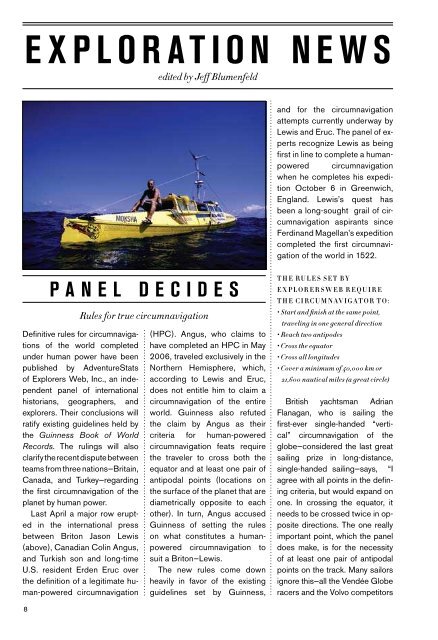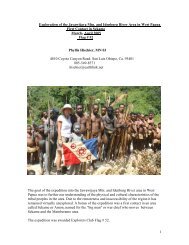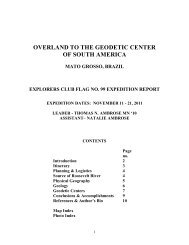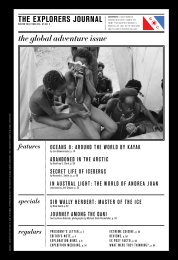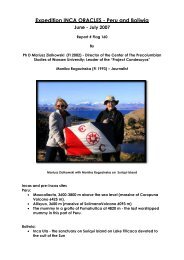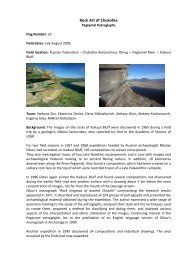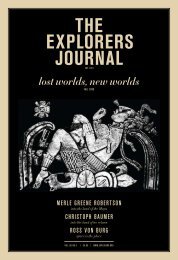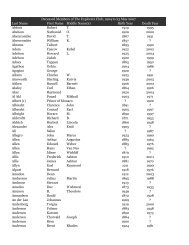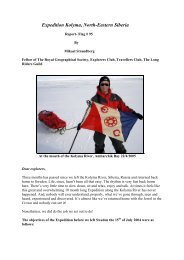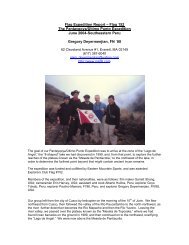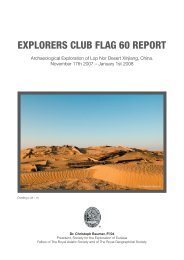the explorers journal the climate change issue - The Explorers Club
the explorers journal the climate change issue - The Explorers Club
the explorers journal the climate change issue - The Explorers Club
Create successful ePaper yourself
Turn your PDF publications into a flip-book with our unique Google optimized e-Paper software.
exploration news<br />
edited by Jeff Blumenfeld<br />
Panel Decides<br />
Rules for true circumnavigation<br />
Definitive rules for circumnavigations<br />
of <strong>the</strong> world completed<br />
under human power have been<br />
published by AdventureStats<br />
of <strong>Explorers</strong> Web, Inc., an independent<br />
panel of international<br />
historians, geographers, and<br />
<strong>explorers</strong>. <strong>The</strong>ir conclusions will<br />
ratify existing guidelines held by<br />
<strong>the</strong> Guinness Book of World<br />
Records. <strong>The</strong> rulings will also<br />
clarify <strong>the</strong> recent dispute between<br />
teams from three nations—Britain,<br />
Canada, and Turkey—regarding<br />
<strong>the</strong> first circumnavigation of <strong>the</strong><br />
planet by human power.<br />
Last April a major row erupted<br />
in <strong>the</strong> international press<br />
between Briton Jason Lewis<br />
(above), Canadian Colin Angus,<br />
and Turkish son and long-time<br />
U.S. resident Erden Eruc over<br />
<strong>the</strong> definition of a legitimate human-powered<br />
circumnavigation<br />
(HPC). Angus, who claims to<br />
have completed an HPC in May<br />
2006, traveled exclusively in <strong>the</strong><br />
Nor<strong>the</strong>rn Hemisphere, which,<br />
according to Lewis and Eruc,<br />
does not entitle him to claim a<br />
circumnavigation of <strong>the</strong> entire<br />
world. Guinness also refuted<br />
<strong>the</strong> claim by Angus as <strong>the</strong>ir<br />
criteria for human-powered<br />
circumnavigation feats require<br />
<strong>the</strong> traveler to cross both <strong>the</strong><br />
equator and at least one pair of<br />
antipodal points (locations on<br />
<strong>the</strong> surface of <strong>the</strong> planet that are<br />
diametrically opposite to each<br />
o<strong>the</strong>r). In turn, Angus accused<br />
Guinness of setting <strong>the</strong> rules<br />
on what constitutes a humanpowered<br />
circumnavigation to<br />
suit a Briton—Lewis.<br />
<strong>The</strong> new rules come down<br />
heavily in favor of <strong>the</strong> existing<br />
guidelines set by Guinness,<br />
and for <strong>the</strong> circumnavigation<br />
attempts currently underway by<br />
Lewis and Eruc. <strong>The</strong> panel of experts<br />
recognize Lewis as being<br />
first in line to complete a humanpowered<br />
circumnavigation<br />
when he completes his expedition<br />
October 6 in Greenwich,<br />
England. Lewis’s quest has<br />
been a long-sought grail of circumnavigation<br />
aspirants since<br />
Ferdinand Magellan’s expedition<br />
completed <strong>the</strong> first circumnavigation<br />
of <strong>the</strong> world in 1522.<br />
<strong>The</strong> rules set by<br />
<strong>explorers</strong>web require<br />
<strong>the</strong> circumnavigator to:<br />
• Start and finish at <strong>the</strong> same point,<br />
traveling in one general direction<br />
• Reach two antipodes<br />
• Cross <strong>the</strong> equator<br />
• Cross all longitudes<br />
• Cover a minimum of 40,000 km or<br />
21,600 nautical miles (a great circle)<br />
British yachtsman Adrian<br />
Flanagan, who is sailing <strong>the</strong><br />
first-ever single-handed “vertical”<br />
circumnavigation of <strong>the</strong><br />
globe—considered <strong>the</strong> last great<br />
sailing prize in long-distance,<br />
single-handed sailing—says, “I<br />
agree with all points in <strong>the</strong> defining<br />
criteria, but would expand on<br />
one. In crossing <strong>the</strong> equator, it<br />
needs to be crossed twice in opposite<br />
directions. <strong>The</strong> one really<br />
important point, which <strong>the</strong> panel<br />
does make, is for <strong>the</strong> necessity<br />
of at least one pair of antipodal<br />
points on <strong>the</strong> track. Many sailors<br />
ignore this—all <strong>the</strong> Vendée Globe<br />
racers and <strong>the</strong> Volvo competitors<br />
THE EXPLORERS CLUB TRAVELERS<br />
Please contact us at:<br />
800-856-8951<br />
9am - 6pm Mon-Fri, ET<br />
Toll line: 603-756-4004<br />
Fax: 603-756-2922<br />
Email: ect@studytours.org<br />
Website: www.<strong>explorers</strong>.org<br />
Travel with <strong>Explorers</strong> <strong>Club</strong> members<br />
and friends on luxurious adventures far<br />
off <strong>the</strong> beaten path in <strong>the</strong> company of<br />
distinguished & engaging leaders.<br />
FEATURED JOURNEY:<br />
Himalayas by Air<br />
March 21–April 7, 2008(18 days)<br />
A World of Adventures<br />
Experience <strong>the</strong> Himalayas’ diverse ethnic<br />
groups, religious traditions, wildlife habitats,<br />
and biodiversity in a single, unforgettable 18-day<br />
journey, visiting India, Bhutan, Myanmar, and<br />
China, with an extension to Nepal.<br />
SELECTED JOURNEYS<br />
<strong>The</strong> Farside of Antarctica<br />
December 1, 2007–January 7, 2008 (38 days)<br />
Ultimate Serengeti Safari<br />
February 12–24, 2008 (13 days)<br />
Chile’s Patagonian Fjords &<br />
<strong>the</strong> Falkland Islands<br />
February 18–March 2, 2008 (14 days)<br />
From Cape Horn to<br />
<strong>the</strong> Cape of Good Hope<br />
February 28–March 22, 2008 (24 days)<br />
8


